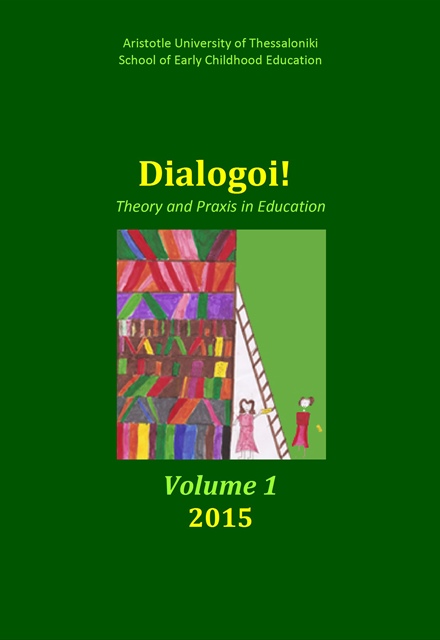Importance and usefulness of the historicity of reading the novel 'Astradeni' by Eugenia Fakinou

Published:
Feb 1, 2016
Keywords:
reading reception theory historicity of reading literary canon
Abstract
The paper focuses on the meaning of “historicity” of a literary work’s reading, namely its readings from the writing time up to now: when, who and how many have read it. With respect to such a question, it is obvious that a literary text’s reading is connected to the different meanings that readers acquire according to different ideologies of the era. The novel Astradeni by Eugenia Fakinou is offered for such an inter-temporal and inter-historical approach as a text pertaining to the literary canon as well as read by adults, young adults and children.
Article Details
- How to Cite
-
Akritopoulos, A. (2016). Importance and usefulness of the historicity of reading the novel ’Astradeni’ by Eugenia Fakinou. Dialogoi! Theory and Praxis in Education, 1, 78–84. https://doi.org/10.12681/dial.8724
- Issue
- Vol. 1 (2015)
- Section
- Varia

This work is licensed under a Creative Commons Attribution-NonCommercial-ShareAlike 4.0 International License.
Authors who publish with this journal agree to the following terms:
- Authors retain copyright and grant the journal right of first publication with the work simultaneously licensed under a Creative Commons Attribution Non-Commercial License that allows others to share the work with an acknowledgement of the work's authorship and initial publication in this journal.
- Authors are able to enter into separate, additional contractual arrangements for the non-exclusive distribution of the journal's published version of the work (e.g. post it to an institutional repository or publish it in a book), with an acknowledgement of its initial publication in this journal.
- Authors are permitted and encouraged to post their work online (preferably in institutional repositories or on their website) prior to and during the submission process, as it can lead to productive exchanges, as well as earlier and greater citation of published work (See The Effect of Open Access).
Downloads
Download data is not yet available.
References
Ακριτόπουλος, Α. Ν. (2004). Υπερδιακειμενικές αναγνώσεις σύγχρονων κοινωνικών μυθιστορημάτων για νέους (Ε. Φακίνου, Ά. Γκέρτζου-Σαρρή, Μ. Πυλιώτου, Μ. Κλιάφα). Στο Τ. Τσιλιμένη (Επιμ.), Το σύγχρονο ελληνικό παιδικό-νεανικό μυθιστόρημα (σσ. 367-397). Θεσσαλονίκη: Σύγχρονοι Ορίζοντες.
Ανθολόγιο Λογοτεχνικών Κειμένων, Ε΄ και ΣΤ΄ Δημοτικού, Με λογισμό και μ’ όνειρο (2001). Αθήνα: Ο.Ε.Δ.Β.
Βασιλαράκης, Ι. Ν. (2002). «Βιβλίο για παιδιά» ή «….και για παιδιά»: πάνω στη διαφορά του βασανιστικού «και» με ζητούμενο γνώμονα την αναγνωσιμότητα. Στο Ά. Κατσίκη-Γκίβαλου (Επιμ.), Η λογοτεχνία σήμερα, Όψεις, αναθεωρήσεις, προοπτικές (σσ. 91-97). Αθήνα: Ελληνικά Γράμματα.
Γιάκος, Δ. (1989). Ιστορία της Παιδικής Λογοτεχνίας. Από τον ΙΘ΄ αιώνα έως σήμερα (8η εκδ.). Αθήνα: Παπαδήμας.
Δελώνης, Α. (1990). Ελληνική Παιδική Λογοτεχνία. 1835-1985. Από τις πρώτες ρίζες μέχρι σήμερα (2η εκδ.). Αθήνα: Ηράκλειτος.
Ιbsch, E. (2010). Η λογοτεχνική πρόσληψη. Στο M. Angenot, J. Bessière, D. Fokkema, & E. Kuschner (Επιμ.), Θεωρία της Λογοτεχνίας. Προβλήματα και προοπτικές (Τ. Δημητρούλια, μτφρ.) (σσ. 399-435). Αθήνα: Gutenberg.
Καλασαρίδου, Σ. (2013). Η αναγνωστική συμπεριφορά παιδιών και εφήβων στις δημοτικές βιβλιοθήκες της Θεσσαλονίκης: Ερωτήματα και δεδομένα, τάσεις και προοπτικές. Στο Ά. Κατσίκη-Γκίβαλου & Δ. Πολίτης (Επιμ.), Καλλιεργώντας τη φιλαναγνωσία. Πραγματικότητες και προοπτικές (σσ. 355-371). Αθήνα: Διάδραση.
Κανατσούλη, Μ. (2002). Λογοτεχνία ενηλίκων, λογοτεχνία παιδιών: σημεία σύγκλισης δύο διαφορετικών (;) λογοτεχνιών. Στο Ά. Κατσίκη-Γκίβαλου (Επιμ.), Η λογοτεχνία σήμερα, Όψεις, αναθεωρήσεις, προοπτικές (σσ. 98-104). Αθήνα: Ελληνικά Γράμματα.
Καρακίτσιος, Α. (2015). Πώς γράφεται ένα κακό παιδικό βιβλίο; Ο αναγνώστης. Ανακτήθηκε από http://www.oanagnostis.gr/pos-grafete-ena-kako-pediko-vivlio-3/
Κομνινού, Ν. (2006). Το βραβευμένο ελληνικό εφηβικό μυθιστόρημα (1985-2004) / The awarded young adult novel in Greece (1985-2004) (Master of Philosophy). University of Sydney, Australia. Ανακτήθηκε από http://ses.library.usyd.edu.au/bitstream/2123/2764/2/02whole.pdf
Naumann, M. (1973). Gesellschaft, Literatur, Lesen. Literaturrezeption in theoretischer Sicht. Berlin-Weimar: Aufbau-Verlag.
Σακελλαρίου, Χ. (1985). Ιστορία της Παιδικής Λογοτεχνίας. Ελληνική και Παγκόσμια (3η εκδ.). Αθήνα: Φιλιππότη.
Τσιλιμένη, Τ. (επιμ.) (2004). Το σύγχρονο ελληνικό παιδικό-νεανικό μυθιστόρημα. Θεσσαλονίκη: Σύγχρονοι Ορίζοντες.
Φακίνου, Ε. (1982). Αστραδενή. Αθήνα: Κέδρος.
Φρυδάκη, Ε. (2003). Η θεωρία της λογοτεχνίας στην πράξη της διδασκαλίας. Αθήνα: Κριτική.
Χρυσομάλλη-Heinrich, Κ. (1999). Το ύφος ως συνισταμένη των δομών βάθους και της λεκτικής επιφάνειας τoυ κειμένoυ. Στο Α. Αργυρίου, Κ. Α. Δημάδης, & Α. Δ. Λαζαρίδου (Επιμ.), Πρακτικά τoυ Α΄ Ευρωπαϊκού Συνεδρίoυ Νεoελληνικών Σπουδών: Ο Ελληνικός κόσμος ανάμεσα στην Ανατολή και τη Δύση 1453-1981, τόμος Α΄ (σσ. 267-283). Αθήνα: Ελληνικά Γράμματα.
Χρονάκη, Ά. (2010). Η συμβολή της ανάγνωσης μυθιστορημάτων στη διαμόρφωση της υποκειμενικότητας των εφήβων (Διδακτορική διατριβή). Αριστοτέλειο Πανεπιστήμιο Θεσσαλονίκης. Ανακτήθηκε από http://www.didaktorika.gr/eadd/handle/10442/28848


